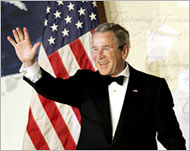Arabs wary of Bush’s ‘freedom’ speech
George Bush’s pledge to spread liberty around the globe has earned a frosty reception in the Arab world, with observers dismissing as hollow rhetoric his insistence on promoting freedom.

On Friday analysts warned that the US president’s ambition to promote democracy would only be regarded with suspicion in the Middle East so long as Iraq is plagued by violence after the US-led invasion.
An Arab professor of political science drew parallels between the words of Bush and Usama bin Ladin, saying the president had made the word freedom banal in the same way as the al-Qaida leader had the word jihad.
“The two men have both invoked their favourite concepts without ever putting them into practice,” Assad Abu Khalil, who works in the United States, told Aljazeera.
Simplistic solutions
He said Bush’s notion of freedom as the solution is just as simplistic as the belief of Islamists that Islam is the solution in a region largely ruled by totalitarian regimes that reject religious extremism.
“By wanting to explain all through freedom, Bush ends up explaining nothing. We need to see how the idea of liberty can be translated into effective policies,” he said.
“The export of democracy is in no way a military operation.”
In a speech marking his inauguration on Thursday to a second, four-year term, Bush said the United States would support the growth of democracy “with the ultimate goal of ending tyranny in our world”.
“We are led, by events and common sense, to one conclusion: The survival of liberty in our land increasingly depends on the success of liberty in other lands. The best hope for peace in our world is the expansion of freedom in all the world.”
He did not name any countries specifically – not even Iraq – but Vice-President Dick Cheney told US media that Iran was “right at the top of the list” of trouble spots.
Reform
Critics say he has yet to put any real pressure on US-friendly Arab states to reform and Washington‘s support for Israel at the expense of the Palestinians has further shredded his credibility in Arab eyes.
 |
|
Bush needs to put pressure on |
“We don’t see any credible handling of despotic regimes in the Arab region,” said Egyptian political analyst Muhammad al-Sayid Said. “There are people in the region who are his own dictators working for him.”
“I’m expecting US pressure on friendly dictators, even if they cannot do anything with some of their foes. They could demand a timetable for democratisation,” Egyptian civil rights activist Saadiddin Ibrahim added.
Bush had disappointed by not pushing US allies such as Egypt, Tunisia and Saudi Arabia to pursue democratic reform, said Ibrahim, who is making a symbolic bid for the Egyptian presidency this year.
“One simple test would be to stop inviting despotic leaders to Washington,” he said. “Use aid, trade and technology as peaceful pressure on these regimes to bring about the required democratic change,” he said.
Liberty
Egyptian writer and analyst Abd al-Karim al-Karimi said Bush’s lavish “coronation ceremony” was a throwback to the colonial era and lambasted the president’s address for promoting “democracy without content”.
|
“What is the meaning of the democracy and the political liberties that the United States wants to impose in the Middle East. Bush does not say”
Abd al-Karim al-Karimi, |
“All the world talks about liberty, but what liberty is it? What is the meaning of the democracy and the political liberties that the United States wants to impose in the Middle East? Bush does not say,” he told Egyptian television.
For Iraqi analyst Abd al-Hussain Shaaban the US administration has lost its credibility to promote democracy after launching an invasion of Iraq that two years on has left the country lacking the most basic security.
“The United States is closing its eyes towards dictators who serve its own interests but attacks those that damage it,” he added, in a reference to key US ally Saudi Arabia.
“The fact that Iraq is in chaos and under military occupation does not bode well for democracy coming to the country and to the Middle East.”